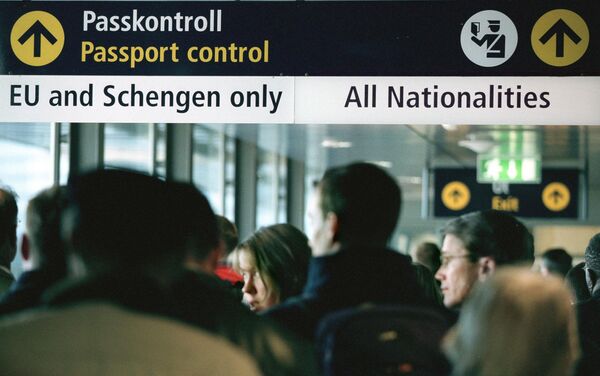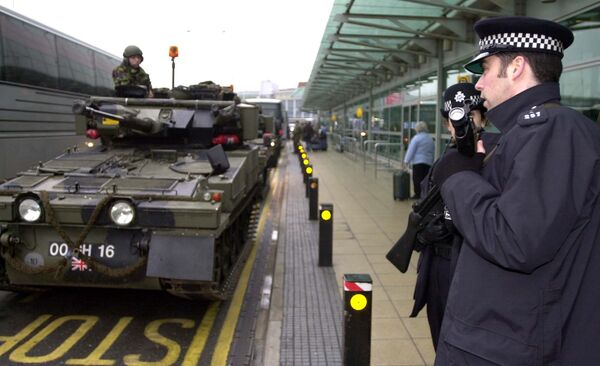Labour MP Yvette Cooper, who is also Chair of the Home Affairs Committee, received letters from the Chair of the National Police Chiefs’ Council (NPCC) Martin Hewitt and Steve Rodhouse, Director General Operations at the UK’s National Crime Agency (NCA).
— Yvette Cooper (@YvetteCooperMP) November 17, 2020
The two reports estimated that in case of a no-deal between the EU and the UK, Britain will have to rely on slower fallback systems when it comes to policing and security.
Cooper criticized the possibility of a weakened control of national security and called on the UK government to be “honest about the security risks and make sure they get a strong security agreement in place.”
NPCC’s Martin Hewitt, said in his letter that even with contingencies in place, British policing will enjoy less visibility of information/intelligence if there is a non-negotiated outcome (NNO) in ongoing Brexit talks.
Both reports elaborated on how different areas of UK national security and policing will be affected by a no deal, including information access, fast track surrender and extradition, checking on criminal records of individuals from overseas databases, data sharing, training and guidance for the police force.
Schengen Information System (SISII)
Loss of access to SISII loss will have a major operational impact, according to Hewitt. He warned that fall back for loss of SISII is Interpol, which is “not linked to national systems,” will be slower and lack the capability of SISII.
“SIS II enables UK and EU Member States (MS) to share and act on real-time data on persons and objects of interest including wanted and missing persons. MS have access to a vast amount of information - for example, SIS II contained a cumulative total of over 983,000 alerts on persons (as of 31 December 2019). UK Law Enforcement (UKLE) has made extensive use of SIS II, which (as of 31 December 2019), contained 4.6 million UK alerts relating to people and objects, including over 37,000 person alerts circulated by the UK,” NCA’s Chief Steven Rodhouse said in his letter.
He also cited the European Commission in his report, to say that there is no legal basis for the UK to retain access to SISII after December 2020.
The fallback option for Britain, Interpol systems are not directly integrated into UK Police National Computer PNC and Border systems. Therefore, the upload/circulation of UK Notices and Diffusions is manual, so it takes longer, said Rodhouse.
European Arrest Warrant (EAW)
Britain benefits extensively from the use of EAW to enable the fast track surrender and extradition of wanted individuals to and from EU states. According to Hewitt, the UK has the chance to negotiate an “arrangement that builds on the Norway/Iceland agreement” which is based on “mutual confidence” rather than “mutual recognition” of the parties’ judicial systems.
NPCC explains that there is little practical difference between the EAW and the Norway/Iceland agreement. However, as opposed to the UK, Norway and Iceland will both remain within the Schengen Area and keep access to SISII. The letter also noted that EU countries may refuse to extradite their own citizens under a Norway/Iceland agreement, which is not the case under the current EAW process.
“Germany, Austria and Slovenia have already indicated they will not extradite their own nationals,” the letter added.
Further, in its preparation for the end of the transition period, the UK’s International Crime Coordination Centre (ICCC) has received Home Office funding to create a National Extradition Unit (NEU).
“This unit consisting of 40 staff, will be operational from the 31st December and will be responsible for all operational extradition across England & Wales, covering every aspect of the process from manhunts and the Extradition Court process through to removals and collections,” NPCC report explained, giving further details on warrant and arrest procedures.
Passenger Name Records (PNR), ECRIS & Europol
UK Home Office is leading preparations for the potential loss of access to PNR, in the event of a NNO.
“The UK is a leader in the use of PNR, with significant traffic coming through UK airports. An inability to access PNR would have a major impact for CT and Serious and Organised Crime related matters. Without the legal basis provided by the PNR Directive, it is difficult to foresee how such data could be shared by EUMS with the UK,” Hewitt told Cooper in his letter.
If Britain loses access to the European Criminal Records Information System (ECRIS), it will significantly slow its ability to check criminal records of individuals from overseas databases, meaning that “securing overseas conviction data would move from an average of 6 days to 66 days.”
NCA reported that UK is consistently the most active Member State in terms of the total volume of notifications, requests and replies sent to other member states via ECRIS.
“In 2019, ACRO notified member states of over 31,000 convictions handed down to their nationals in the UK and responded to over 3000 requests (24,852 offences) for conviction information from the EU relating to UK Nationals offending in the EU,” the NCA letter said.
In case of a NNO, Britain would leave Europol, with very basic wind-down provisions under Title V of the Withdrawal Act, police chiefs explained, adding that London would aim to put in place a basic working arrangement with the Agency to retain liaison officers.
“The EU draft text states that a UK liaison delegation for Europol and a UK liaison magistrate for Eurojust may be agreed, but participation in meetings and operational activity is by invitation and with the approval of the other participating EUMS. Access to Europol is likely to be less of an issue if the UK can secure a large enough delegation to be able to secure influence,” the NCA letter reported.
Both Hewitt and Rodhouse reported that the uncertainty around Brexit deal negotiations makes it difficult to provide and plan for appropriate training for front line officers.
Commenting on the operation impact from the loss of access to European databases and memberships,
In both a NO and NNO scenario, the alternative measures are less automated and more unwieldy to use, UK’s National Lead on Counter Terrorism Policing, AC Neil Basu said that in both a NO and NNO scenario, the alternative measures are less automated and more unwieldy to use.
The Brexit transition period will last until the end of 2020 while the UK and EU negotiate additional arrangements. New rules take effect on 1 January 2021.








